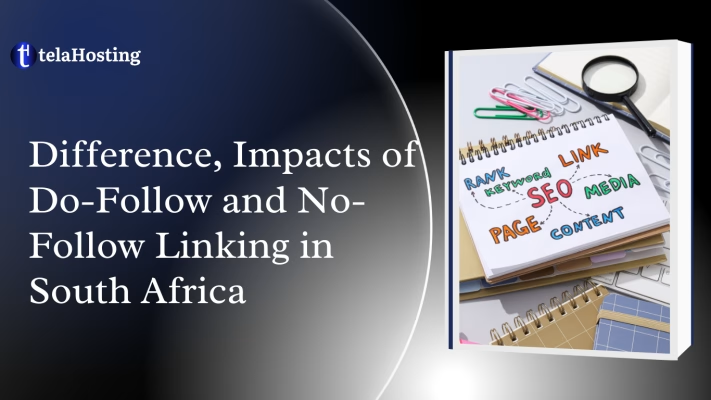
Link building—whether it’s no-follow or do-follow—is one of the most important aspects of search engine optimisation (SEO). Done correctly, it can help your website build authority, drive quality traffic, and improve rankings on search engines like Google or Bing.
If you want your website to perform better online in South Africa’s competitive digital space, understanding the difference between do-follow and no-follow links is essential.
What Are Do-Follow Links?
A do-follow link is a hyperlink that allows search engines to “follow” it and pass link equity (also called “link juice”) from one site to another. This type of link directly helps the linked website improve its rankings and authority.
Key Features of Do-Follow Links:
- Boosts a website’s domain and page authority.
- Positively impacts search engine rankings.
- Helps bring more organic traffic to the linked site.
Example:
<a href="https://example.com" rel="dofollow">Visit Example</a>
(Note: All links are do-follow by default unless marked otherwise.)
For example, if a South African travel agency links to a tourism blog post about Cape Town attractions using a do-follow link, it helps that blog rank higher while connecting the agency’s brand with valuable local content.
What Are No-Follow Links?
A no-follow link tells search engines not to pass link equity to the linked website. While it doesn’t directly improve SEO rankings, it can still drive valuable referral traffic and help maintain a natural backlink profile.
Key Features of No-Follow Links:
- Doesn’t pass SEO value (“link juice”).
- No direct effect on rankings.
- Ideal for linking to untrusted, paid, or sponsored content.
Example:
<a href="https://example.com" rel="nofollow">Visit Example</a>
Google introduced the no-follow attribute in 2005 to fight spam and regulate paid links.
For instance, if a South African influencer shares a paid product link on their blog, they would use a no-follow link to follow Google’s guidelines while still sending traffic to the brand’s site.
Differences Between Do-Follow and No-Follow Links
| Aspect | Do-Follow Links | No-Follow Links |
|---|---|---|
| Pass Link Equity | ✅ Yes | ❌ No |
| Affects SEO | Directly improves rankings | Indirectly via referral traffic |
| Usage | For trusted, relevant sources | For paid, sponsored, or unverified links |
| Search Engine Behavior | Follows and indexes the page | Ignores link for ranking purposes |
Impacts Of These Links And Why They Matter in South Africa
1. For South African Businesses
- Do-Follow Links: Help improve rankings and visibility, especially when coming from trusted local sites like News24, BusinessTech, or industry-specific directories.
- No-Follow Links: Maintain a balanced backlink profile and bring referral traffic from social media or sponsored placements.
2. For Bloggers & Content Creators
- Do-Follow Links: Essential for building domain authority—guest posts on other South African blogs are a great way to earn these.
- No-Follow Links: Still useful for brand exposure, particularly on forums, Facebook groups, or paid campaigns.
3. For E-Commerce Stores
- Do-Follow Links: Improve search visibility, vital for competing in the growing South African online retail market.
- No-Follow Links: Best for affiliate links or sponsored posts to remain compliant with Google’s policies.
Best Practices for Link Building in South Africa
- Balance Your Links: Use both do-follow and no-follow for a healthy backlink profile.
- Quality Over Quantity: Get links from reputable South African websites rather than spammy, irrelevant sites.
- Leverage Local Directories: Listings on platforms like Brabys or Yellow Pages SA can be valuable.
- Avoid Link Schemes: Don’t buy links—Google penalties can seriously hurt your rankings.
- Use Social Media: Even though most social media links are no-follow, they still drive brand visibility and clicks.
FAQs
- Can no-follow links still bring traffic?
Yes. They may not boost SEO directly, but they can send relevant visitors from trusted sources. - How do I check if a link is no-follow or do-follow?
Right-click and inspect the HTML code. If it saysrel="nofollow", it’s no-follow. Otherwise, it’s do-follow. - Are do-follow links better than no-follow links?
They serve different purposes. Do-follow helps SEO rankings, while no-follow ensures balance and still drives traffic. - Should I pay for do-follow links?
No. Buying links violates Google’s rules and can result in penalties. Focus on earning them naturally.
Conclusion
For South African websites—whether you’re running a small business, blog, or online store—using a mix of do-follow and no-follow links is essential for a well-rounded SEO strategy. Do-follow links boost rankings, while no-follow links keep your link profile healthy and bring valuable traffic.
When used strategically, both can help you grow your online presence and attract more of the right audience.